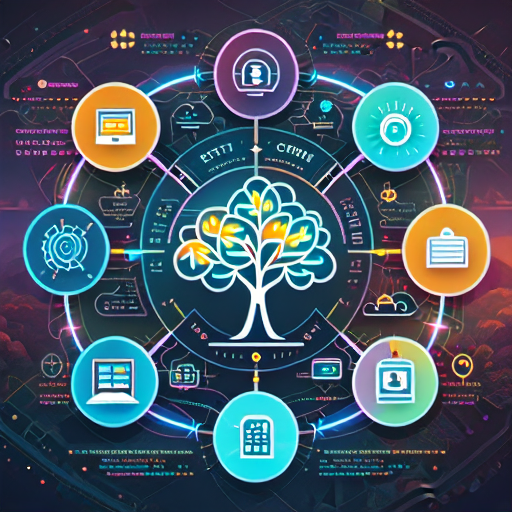
1. AI-Powered Virtual Assistants
Virtual assistants will become smarter and more intuitive, acting as your personal work companion. These tools will handle administrative tasks, manage schedules, and even provide insights to help you make better decisions.
Use Case: Automating email responses, scheduling meetings, and generating meeting summaries.
2. Generative AI for Content Creation
Generative AI tools will revolutionize content creation by automating the production of text, images, videos, and even code. These tools will save time and boost creativity.
- GPT-4 (OpenAI)
- DALL·E (OpenAI)
- MidJourney
- GitHub Copilot
- Jasper AI (for marketing copy)
- Runway ML (for video editing)
Use Case: Writing blog posts, designing marketing materials, and generating code snippets.
3. AI-Driven Project Management Tools
AI will enhance project management by optimizing workflows, predicting risks, and improving team collaboration. These tools will ensure projects are completed on time and within budget.
- Asana (with AI integrations)
- Trello (with AI-powered automation)
- Monday.com (with AI insights)
- Wrike (with predictive analytics)
- ClickUp (with AI task prioritization)
Use Case: Automating task assignments, predicting project delays, and optimizing resource allocation.
4. AI for Data Analysis and Business Intelligence
AI-powered analytics tools will make it easier to process and interpret large datasets, enabling data-driven decision-making. These tools will provide actionable insights without requiring advanced technical skills.
- Tableau (with AI-driven insights)
- Power BI (Microsoft)
- Google Analytics (AI-enhanced)
- Sisense
- ThoughtSpot (natural language queries)
Use Case: Identifying sales trends, forecasting market demand, and optimizing supply chains.
5. AI-Enhanced Communication Tools
Communication platforms will leverage AI to improve collaboration, especially for remote and global teams. Features like real-time translation, sentiment analysis, and automated summaries will become standard.
- Slack (with AI-powered search and summaries)
- Microsoft Teams (with AI meeting insights)
- Zoom (with AI transcription and highlights)
- Otter.ai (for meeting notes)
- Grammarly (for real-time writing assistance)
Use Case: Translating conversations in real-time, summarizing meetings, and analyzing team sentiment.
6. AI in Cybersecurity
As cyber threats grow more sophisticated, AI will play a critical role in protecting sensitive data and systems. AI-powered cybersecurity tools will detect and respond to threats in real-time.
Use Case: Detecting unusual network activity, automating threat responses, and predicting vulnerabilities.
7. AI for Personalized Learning and Upskilling
AI-driven learning platforms will transform professional development by offering personalized training programs tailored to individual needs and career goals.
- Coursera (with AI course recommendations)
- Udemy (with personalized learning paths)
- LinkedIn Learning (AI-enhanced)
- Degreed
- Sana Labs (adaptive learning)
Use Case: Recommending courses, simulating real-world scenarios, and tracking learning progress.
8. AI in Creative Industries
AI tools will empower creatives by automating repetitive tasks and offering new ways to express ideas. From music composition to video editing, AI will enhance creativity.
- Runway ML (for video editing)
- Amper Music (for music composition)
- Adobe Firefly (for design)
- Canva (AI-powered design tools)
- Artbreeder (for image generation)
Use Case: Generating music tracks, editing videos, and creating visual designs.
9. AI for Remote Work and Collaboration
With remote work becoming the norm, AI tools will bridge the gap between distributed teams by creating virtual workspaces and improving collaboration.
- Miro (with AI-powered brainstorming)
- Figma (with AI design suggestions)
- Notion (with AI organization tools)
- Tandem (virtual office for remote teams)
- Slab (AI-enhanced knowledge management)
Use Case: Brainstorming in virtual workspaces, automating document organization, and enhancing team collaboration.
10. AI in Healthcare and Well-being
AI will play a significant role in promoting employee well-being by offering personalized health recommendations and mental health support.
- Headspace (for mental health)
- Calm (for stress management)
- Woebot (AI mental health chatbot)
- Fitbit (AI-powered fitness tracking)
- Welltory (AI wellness app)
Use Case: Providing mental health support, recommending fitness routines, and tracking wellness metrics.
11. AI for Customer Service and Support
AI-powered chatbots and virtual agents will handle customer inquiries, resolve issues, and provide personalized recommendations, improving customer satisfaction.
- Zendesk (with AI chatbots)
- Intercom (with AI-powered support)
- Drift (AI conversational marketing)
- Freshdesk (AI ticketing system)
- Ada (AI customer support platform)
Use Case: Automating customer support, analyzing customer feedback, and personalizing interactions.
12. AI in Recruitment and HR
AI tools will streamline recruitment processes by automating resume screening, conducting initial interviews, and identifying the best candidates for roles.
- HireVue (AI video interviews)
- Pymetrics (AI-based candidate matching)
- LinkedIn Talent Solutions (AI recruitment)
- Textio (AI for job descriptions)
- Hiretual (AI sourcing platform)
Use Case: Screening resumes, conducting video interviews, and predicting candidate success.
13. AI for Financial Management
AI will revolutionize financial management by automating budgeting, forecasting, and investment decisions. These tools will help businesses and individuals manage their finances more effectively.
- QuickBooks (AI-powered accounting)
- Xero (AI financial insights)
- Mint (AI budgeting)
- Cleo (AI financial assistant)
- Wealthfront (AI investment management)
Use Case: Automating expense tracking, predicting cash flow, and optimizing investments.
14. AI in Supply Chain and Logistics
AI will optimize supply chain operations by predicting demand, managing inventory, and improving delivery efficiency.
- SAP Integrated Business Planning
- Locus (route optimization)
- ClearMetal (supply chain visibility)
- FourKites (AI logistics tracking)
- Blue Yonder (AI demand forecasting)
Use Case: Forecasting demand, optimizing inventory levels, and improving delivery routes.
15. AI for Legal and Compliance
AI tools will assist legal professionals by automating document review, contract analysis, and compliance monitoring.
- LawGeex (AI contract review)
- Kira Systems (AI for contract analysis)
- Relativity (AI e-discovery)
- Luminance (AI legal tech)
- Everlaw (AI litigation platform)
Use Case: Reviewing legal documents, identifying compliance risks, and automating contract analysis.
